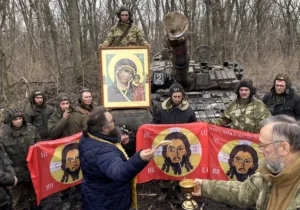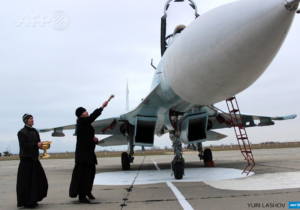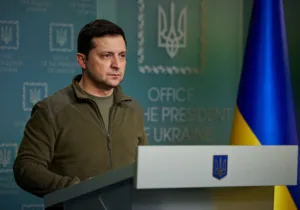We thought we were living in a better world, where international agencies promised diplomatic solutions to the globe’s greatest conflicts. Foreign Policy, assured us in 2011 that “World peace is closer than you think.” The analysis pointed out, “The last decade has seen fewer war deaths than any decade in the past 100 years.” In 2017, Modern Diplomacy, went so far as to publish an analysis that argued “war is obsolete.” A study published in Science Daily in 2020 empirically proved that the world had become less violent in the past three decades. “The change for the better our analysis detected over the past 30 years may be due to peace keeping work by global organisations like the UN and increased collaboration and cooperation between nations.”
Then on February 24, 2022, everything changed.
Russia, a Goliath of military might, rolled into Ukraine expecting an effortless victory, but the underdog breadbasket of Eastern Europe rose to fight with David-like courage. Despite the popular analyses of the last decade, humankind has clearly not evolved to a higher place.
The ubiquitous presence of smartphones has made us all daily eyewitnesses to the fact that all the “progress” and “enlightenment” of modern times have done nothing to solve the problem of humankind’s fallen nature. We’ve watched as Russian artillery fire, with no respect for humanitarian corridors, has reduced Mariupol to rubble. We’ve seen video footage of missiles hitting a theatre, which was clearly marked “children” and sheltered women and their kids, killing hundreds. When Russian troops began pulling out of northern Ukraine, we watched as officials discovered civilians shot execution-style and their bodies left rotting in the streets of the villages of Bucha and Makariv. We saw the pits full of bodies clad in black plastic. Later, when we thought things could not grow more reprobate, a Russian missile with “For the children” scribbled on its side destroyed a train station in Kramatorsk, where women and children tried to flee the warzone. When confronted with these blatant atrocities, Russia’s former deputy foreign minister and current Kremlin consultant, Andrei Fedorov, shrugged his shoulders and flippantly said, “This is war. These things happen.”
As a result of this carnage, the world now faces the largest refugee crisis in Europe since World War II as 10 million people, 25 percent of Ukraine’s total population, have fled their homes, with more than 4.4 million of those crossing into adjacent countries desperately searching for safety.
No, the world has not succeeded in making itself a better place. But if we are willing to get our hands dirty, empowered by the grace of Christ, maybe we can.
We’ll have to move beyond political pontification and academic analysis and hearken to the call of Matthew 25:35: “For I was hungry and you gave me something to eat, I was thirsty and you gave me something to drink, I was a stranger and you invited me in.” Here is where the rubber of our faith meets the road. Here the church has a unique opportunity to reflect the image of our loving God to a very fallen world, and each of us as followers of Christ has a unique piece to contribute.
For Mark Priem, a long-term missionary in Odesa, Ukraine, this means helping his neighbors fill sandbags as missiles explode in the distance, offering them a Christian tract, and praying when the job is done.
For Joszef Danko, a church planter in Berehove, Ukraine, this means meeting the physical and spiritual needs of eastern Ukrainians huddled just inside Ukrainian’s western border not wanting to leave, but ready to step into Hungary if they must. What does he need to continue his tireless ministry? Everything.
For Arpad Horvath-Kavai in Budapest, Hungary, it means serving as a “hub” for receiving and resettling families as they come into Budapest train stations. Arpad also links families to other European country reception organizations.
For Phil Metzger, senior pastor of Calvary Chapel San Diego and former pastor of Calvary Chapel Budapest, Hungary, it means helping the Ukrainian refugees massing in Tijuana, Mexico. Many have traveled for a week and a half just to get to the California-Mexico border, hoping to be granted asylum in the United States. “Our partners are at the airport to meet people, to speak to them in Ukrainian or Russian, to let them know the process,” Metzger told the local news station. “We get them a number, we get them on a bus that the Mexican government is providing us, to take them to what we call the TJ hub where they have an indoor rec center to rest.”
For GoodSports International in Hungary and Slovakia, it means expanding on what it has always done: “Loving God and loving kids.” Because of GoodSports’ 25 years of experience in working with the needy in Eastern Europe, the organization quickly joined the network of churches and non-governmental organizations working to help Ukrainian refugees. GoodSports Slovakia responded immediately with aid supplies to support churches on the Slovakia-Ukraine border. GoodSports Hungary, which ministers in the country’s orphanages, pivoted to partner with churches that were evacuating orphans from eastern Ukraine. To date, the organization assisted in the evacuation of 280 orphans from Ukraine to Freiburg, Germany, in association with its partner, Legacy Refuge.
Many in the initial wave of Ukrainians who have family and friends in Western Europe moved quickly through Central Europe. Lately, however, the less-resourced Ukrainians have come, wanting to stay in border countries of Poland, Hungary, Slovakia, Romania, and Moldova. Many desire to return to Ukraine as soon as possible. However, in the meantime they need food and shelter—a refuge where they can recover and heal—whether they ultimately return or start over again in a new country. In Hungary, the majority of accommodations are for temporary shelter only (48 hours or less). There is a shortage of facilities that will allow refugees the time they need to establish themselves in their new country.
To meet this need, GoodSports Hungary has partnered with Dorcas Camping Center to provide housing for up to six months for Ukrainian refugees. Currently serving 100, the camping center will be able to serve up to 200 in the summer months when they can offer their unheated facilities. At the same time, GoodSports is coming alongside these vulnerable people, providing visits from support animals (therapy dogs), Bible studies, and sports camps where kids can just be kids again. GoodSports knows that its work with 200 Ukrainian refugees amounts to just a drop in the bucket when the Russian invasion has displaced a quarter of Ukraine’s population. But if every follower of Christ is willing to contribute something to help alleviate this suffering—their skills, their prayers, or their resources—it won’t be long before the needs are met.
As the European Union and NATO wrestle with the posturing of Vladimir Putin, the world watches as United Nations officials pare back layer upon layer of human atrocities. What happened to our commitment to the concept of a “just war”? As this story unfolds, the West must balance the needs of the many (a non-nuclear war in Europe) versus the needs of the one (the existence of Ukraine).
During World War II, Reinhold Niebuhr railed against the “Christians in the West who retreated into political pacifism”.1 His message cannot be lost in this current crisis. While NATO is poised ready to fulfill its Article 5 duties, human cruelty in Ukraine demands a response. Will hindsight cry out, “too little, too late,” to European nations preventing World War III? Intentionally, or not, part of Putin’s legacy will be a new world order, “Cold War II.”
For presidents and diplomats, the political crystal ball is murky. For the Christians, however, our path is clear. While we may not be able to create peace on earth, by offering a “cup of cold water” in Jesus’ name, we can bring peace to the hearts of many.
1. Eric Patterson, Christianity and Power Politics Today: Christian Realism and Contemporary Political Dilemmas (New York, Palgrave Macmillan, 2008), 1.
GoodSports Hungary and GoodSports Slovakia teams are working, in partnership with local churches and non-profits, to aid Ukrainian refugees. If you would like to help this effort financially, please use the provided links and in the note box put “Ukraine.” Donations for GoodSports Hungary can be sent here, and for GoodSports Slovakia here.
Thank you for your continued prayers over this situation.






